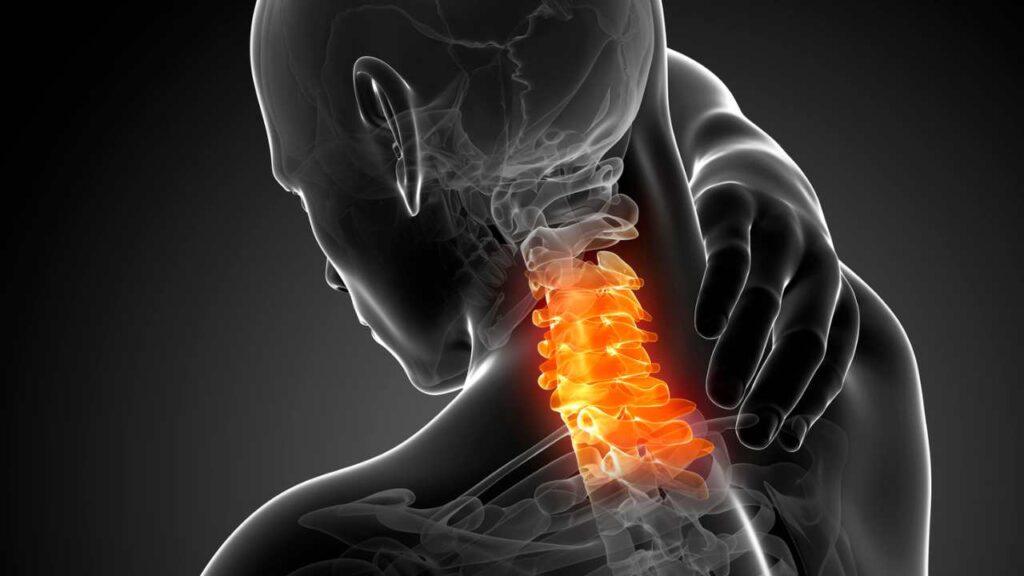Neck pain is a common ailment that affects people of all ages and lifestyles. Whether it’s a result of poor posture, muscle strain, or an underlying medical condition, neck pain can significantly impact one’s daily life. In this comprehensive guide, we will delve into the various aspects of neck pain, exploring its causes, symptoms, and effective remedies to help you understand and manage this discomfort.
I. Causes of Neck Pain:
- Poor Posture:
Neck pain often stems from poor posture, especially in this era of prolonged screen time and sedentary lifestyles. Slouching while sitting or craning the neck forward while using electronic devices can strain the muscles and lead to discomfort. - Muscle Strain:
Overuse or sudden movements of the neck muscles can result in strain, causing pain. Activities such as heavy lifting, repetitive motions, or sleeping in an awkward position may contribute to muscle strain. - Neck Injuries:
Accidents, falls, or sports injuries can cause trauma to the neck, leading to pain and discomfort. Whiplash, a common injury in car accidents, involves a sudden back-and-forth movement of the neck, straining the muscles and ligaments. - Degenerative Disc Disease:
The aging process can contribute to the breakdown of discs in the spine, known as degenerative disc disease. This can lead to neck pain as the discs lose their cushioning ability, resulting in bone-on-bone contact and irritation. - Herniated Disc:
A herniated disc occurs when the soft inner material of a disc pushes through the outer layer. This can put pressure on nearby nerves, causing pain, numbness, or tingling in the neck and surrounding areas. - Arthritis:
Conditions like osteoarthritis or rheumatoid arthritis can affect the joints in the neck, leading to pain and stiffness. Inflammatory processes within the joints contribute to discomfort and reduced range of motion.

II. Symptoms of Neck Pain:
- Pain and Stiffness:
The most common symptom of neck pain is a persistent ache or stiffness in the neck. The discomfort may range from mild to severe, affecting the ability to move the neck freely. - Headaches:
Neck pain can often be accompanied by headaches, especially tension-type headaches. The muscles in the neck and scalp can become tense, leading to headaches that radiate from the base of the skull. - Numbness and Tingling:
In cases where nerve compression or irritation is involved, individuals may experience numbness or tingling sensations in the neck, shoulders, arms, or hands. - Limited Range of Motion:
Neck pain can restrict the range of motion, making it challenging to turn or tilt the head. This limitation in movement can impact daily activities and overall comfort.

III. Remedies and Management:
- Lifestyle Modifications:
Improving posture and incorporating ergonomic practices in daily activities can significantly reduce the risk of neck pain. Regular breaks during prolonged periods of sitting and proper workstation setups contribute to a healthier neck. - Stretching and Exercise:
Engaging in neck exercises and stretches can help strengthen the muscles, improve flexibility, and alleviate tension. Incorporate gentle neck stretches into your routine to maintain optimal neck health. - Heat and Cold Therapy:
Applying heat or cold to the affected area can provide relief from neck pain. Heat helps relax tense muscles, while cold therapy reduces inflammation. Alternate between heat and cold applications for maximum effectiveness. - Pain Medications:
Over-the-counter pain relievers, such as ibuprofen or acetaminophen, can help manage mild to moderate neck pain. Consult with a healthcare professional before using any medications, especially for prolonged periods. - Physical Therapy:
In cases of persistent or severe neck pain, a physical therapist can create a personalized exercise program to address specific issues and improve overall neck function. - Massage and Relaxation Techniques:
Massage therapy can help release tension in the neck muscles and promote relaxation. Additionally, practicing mindfulness, deep breathing, or meditation can reduce stress, which often contributes to neck pain.
Conclusion:
Understanding the causes, symptoms, and remedies for neck pain is crucial for effective management and prevention. By incorporating healthy lifestyle habits, engaging in regular exercise, and seeking professional guidance when needed, individuals can take proactive steps toward maintaining a pain-free and functional neck. If neck pain persists or worsens, it is essential to consult with a healthcare provider for a thorough evaluation and appropriate treatment.
